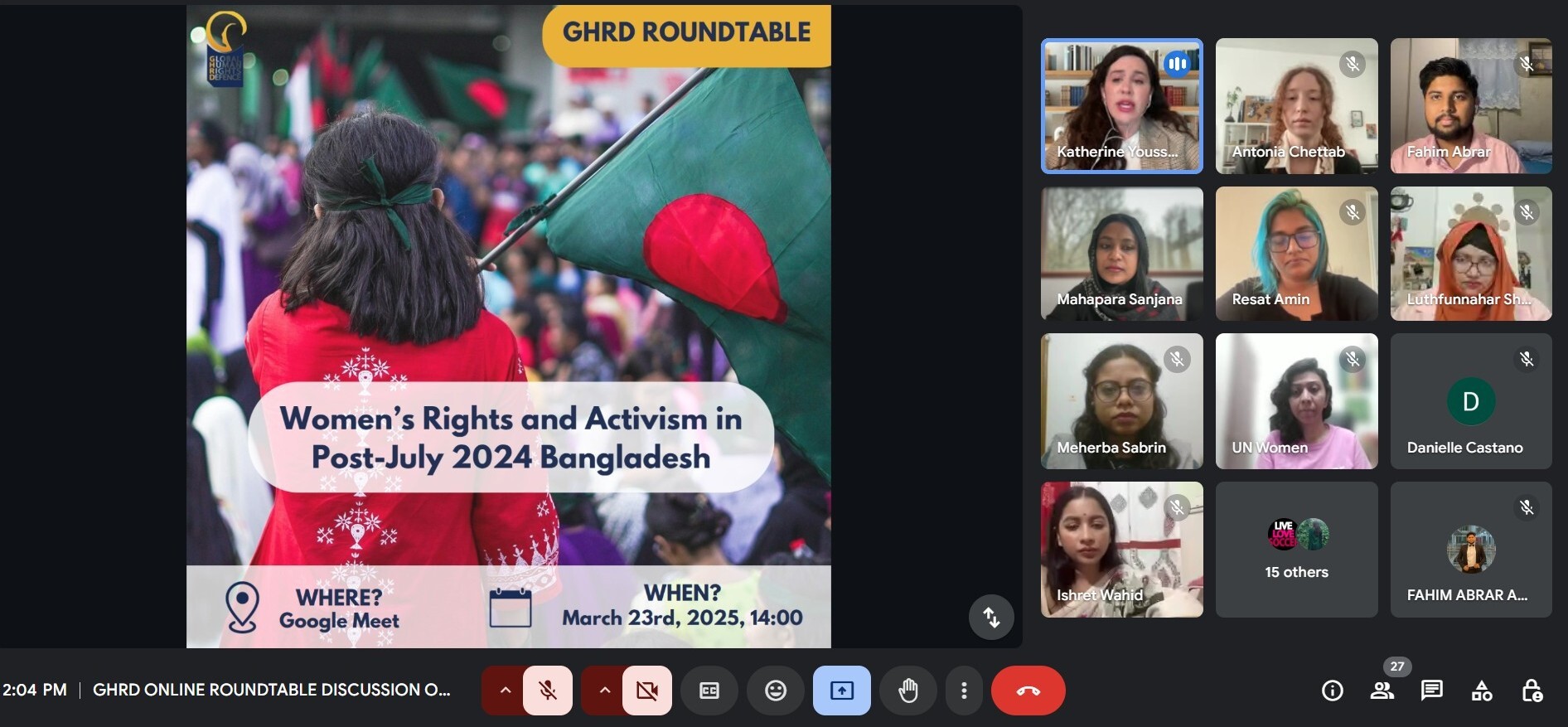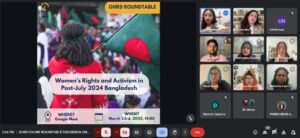- info@ghrd.org
- Mon-Fri: 10.00am - 06:00pm

- This event has passed.
GHRD Online Roundtable Discussion on Women’s Rights and Activism in Post-July 2024 Bangladesh
March 23 @ 2:00 pm - 3:30 pm

On 23 March 2025, Global Human Rights Defence’s Bangladesh Campaign successfully hosted a powerful roundtable webinar focused on Women’s Rights and Activism in Post-July 2024 Bangladesh. The event brought together prominent international experts, academics, and activists, including Syeda Samara Mortada (UN Women Bangladesh), Ishret Binte Wahid (SOAS, University of London), Mahapara Sanjana Khan (University of York), Meherba Sabrin (Eastern University, Bangladesh), Luthfunnahar Shancyi (ActionAid Bangladesh), and Resat Amin Priya (Florida Atlantic University, USA). With over 40 participants in attendance, the discussions provided a platform to address the systemic challenges women and girls continue to face in Bangladesh and beyond.
During the event, the panelists explored the evolving political landscape following the mass protests in July 2024 and the establishment of an interim government. While women played a pivotal role in these movements, they have yet to receive adequate representation in the political sphere. The transition period has led to challenges to women’s rights, including increasing sexual violence, cyberbullying, and societal pressure to withdraw from activism. Despite hopes for democratic and inclusive reforms, women’s rights remain a critical issue.
Syeda Samara Mortada from UN Women Bangladesh provided an in-depth discussion on the organization’s goals in Bangladesh, touching upon issues such as gender-based violence (GBV) as a global crisis, rising child abuse and gang rape, and the GR40 document on women’s political participation. She emphasized the need for legal reforms, including redefining rape to include male victims and addressing the challenges women face in the post-July political environment, where their exclusion from decision-making processes persists.
Ishret Binte Wahid highlighted the historical roots of GBV and its portrayal of women as vulnerable. She discussed the lack of accountability from authorities, law reforms without civil input, and the significance of workplace harassment guidelines. Wahid also underscored the role of patriarchy in politics, the private sector’s involvement, and the need for a holistic approach to gender equity.
Mahapara Sanjana Khan brought attention to the role of social justice in education and the empowerment of women. She stressed the lack of female inclusion in discussions and the need for equitable scholarships, gender-sensitive teaching, and education as a tool for social change, particularly for marginalized women.
Meherba Sabrin discussed the insufficiency of the current legal system and the controversial reform of the Women Act 2020. She also touched on hate speech against women on religious platforms and the importance of educating religious leaders about laws and policies. Sabrin called for stronger victim support systems and highlighted the necessity for legal reforms that genuinely protect women’s rights.
Luthfunnahar Shancyi shared her personal story of childhood abuse and emphasized that GBV affects all genders. She discussed the challenges victims face in accessing support and the vital role of NGOs such as BLAST, BRAC, and Naripokkho in providing assistance. Shancyi called for GBV prevention initiatives, law reform, improved data collection, and a national campaign focused on education, victim support, and accountability.
Resat Amin Priya shed light on mass media’s portrayal of men as earners and the focus on women’s sexual identity over intellectual power. She explored the marginalization of empowered women and the role of social media in shaping societal views. Priya also emphasized the need for reform in institutional thought and the regulation of social media to ensure a more balanced and inclusive representation of women.
This event served as a critical reminder of the urgent need for continued advocacy, policy interventions, and community engagement to ensure meaningful progress for women’s rights in Bangladesh. The insights shared by the panelists reinforced the importance of ongoing efforts to protect and advance women’s rights during this crucial period.
Thank you to all our 40+ guests for joining us and contributing to these essential discussions!

